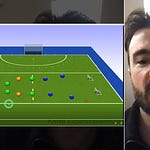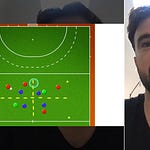Russell Coates designed a new practice session on attacking through the middle. By now you’re too late t join us live to get your questions in and together build that practice session. Good thing you can watch it here on demand ;)
Russell Coates
An experienced coach, trainer and technical director in The Netherlands, Russell Coates 🇳🇱 founded hockeyplatform.nl where he shares his drills and practice sessions with clubs and academies. Russell and thehockeysite.com decided to work together and bring a monthly workshop in which he will build and share a full practice session in XPS together with you. Each session will focus on one particular topic.
On November 27, 2024 we spoke about attacking through the middle, using the channels or half-spaces.
Importance of the Channels/Half Spaces
Coates begins his presentation by explaining why attacking through the channels, or half spaces, is an important area of focus for field hockey teams. He notes that in recent years, penalty corner defenses have improved considerably, which means teams need to find other ways to score field goals.
The channel, or half space, is the area of the field that lies between the center of the pitch and the sidelines. This area, particularly in the final third of the field, is being referred to as the assist zone because research has shown that most assists in hockey come from this part of the field.
Coates argues that attacking through the assist zone, rather than through the center or wide areas of the pitch, provides attacking players with more options. This is because:
Attacking through the center often leads to congestion and makes it easier for defenders to double team the player with the ball.
Attacking down the sidelines allows the defense to use the sideline as an extra defender.
When an attacker receives the ball in the assist zone, they are likely to have an open body position, allowing them to see multiple passing options. Attackers receiving the ball in the center of the field often receive the ball with their back to the goal.
Drills
Coates then presents five drills coaches can use to help their players understand the importance of using the channels in attack.
Drill 1: Three Versus Two Rondo (or Small-Sided Game)
The first drill is a three versus two rondo, which can also be adapted into a small-sided game. This drill is designed to get players thinking about using the channels early in practice, when the area is more confined.
Setup: The drill uses a wide grid, marked by four cones, with mini goals at either end. The grid's width depends on the number of players participating. Two gates are set up in the channels on each side of the grid.
How it works: Three attackers pass the ball around and try to transfer the ball to the other side of the grid through the gates. If the attackers complete a certain number of passes before transferring the ball through the gate, they earn a point. Defenders can earn a point by winning the ball and scoring in the mini goals.
Adaptations: Coaches can adapt this drill by:
Removing a defender or adding an attacker if the attacking team is struggling to maintain possession.
Making the drill into a six versus four game, in which teams earn a point for every time they pass or carry the ball through the gates.
Making it a four versus four or three versus three small-sided game, with teams scoring in mini goals on either end of the grid.















